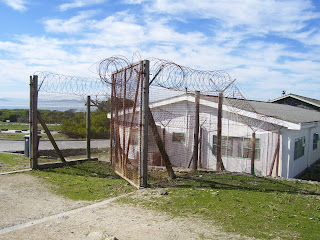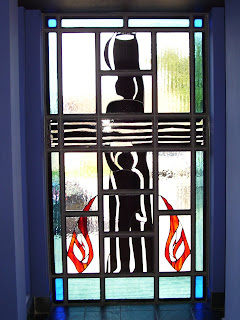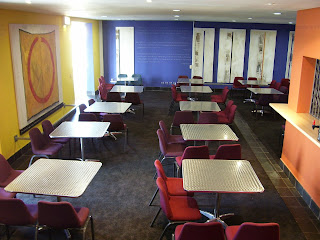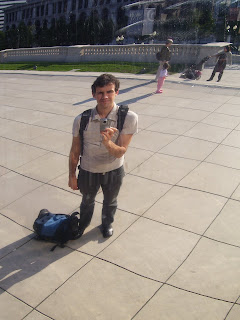
I mentioned the Truth and Reconciliation Commissions in my last post, and I wanted to post about this extraordinary process. While I have been here, I have read as many books as I could about South Africa, including novels and non-fiction. Two in particular that I want to recommend are No Future Without Forgiveness by Desmond Tutu, Nobel Laureate and retired Anglican Archbishop of Cape Town (pictured with South African PTS professor Wentzel Van Huyssteen); and Country of My Skull by Antjie Krog, an Afrikaaner journalist and poet who covered the Truth and Reconciliation Commissions.
As you might expect, Tutu's book is more theologically-minded, and his theology around the concept of ubuntu crops up in this book although he elaborates in much more detail in his other writings. The accounts of the victims are moving, profound, and terrible. Tutu's writing style is very approachable, and includes some of his personal reactions and insights as a person of faith acting as the chairperson of the Commissions. Krog's is a more challenging read, both because she brings her poetic sensibilities to bear (which may be the only way to really express the depth of human emotion and pain that came up in the Commissions) and because she is much more graphic and comprehensive in her reporting of what victims went through. If you are going to read both, I would read Tutu's first. I read them in the opposite order and found that Krog set the bar pretty high in terms of literary style, which may have dimished somewhat my appreciation of Tutu's simple and straightforward style. Krog also gushes with admiration for Tutu, while also giving an account of her observations of him during the Commissions process. That perspective too I might have appreciated more had I read the books in the opposite order. Both are excellent, however, and both deserve to be read. I was tempted to call this post "Required reading for being human," and I recommend these books over any others that I have read here. The applications of an undertaking like these Truth Commissions to other conflicts in the world (in particular I think of Israel/Palestine and possibly Iraq) kept coming to mind as I read. South Africa's were not the first such commissions, but they may have come closer than any others to meeting their objectives.
Now a further word about why these Truth Commissions came about. As I was saying in the last post, the country was basically in civil war in the 1970 and '80s, and a lot of people suffered terribly under police brutality and torture of the most grotesque and shocking variety. Mr. Mbatha, my tour guide from Robben Island, told our group that he had been tortured by the security police, although he did not go into details aside from saying that women who were taken in had it much worse. Affiliates of the ANC and other counter-regime forces had done their fair share of awful deeds too, including bombings and "necklacing" informers, which involved hanging a petrol-soaked tire around someone's neck and setting it (and the person) on fire. The only way democracy was able to come about in this context was by providing a forum where victims could come forward to tell their stories and ideally receive some form of restitution (although this almost never happened), and where perpetrators could confess to an Amnesty Commission (completely independent of the Truth and Reconciliation Commission) and be awarded legal amnesty for the actions they confessed.
This latter provision was obviously controversial. Among other notables the family of Steve Biko (http://africanhistory.about.com/library/biographies/blbio-stevebiko.htm or check wikipedia), a prominent black activist who was tortured and beaten to death by the security police in the late 1970s, publicly denounced and refused to recognize the authority of the Amnesty Commission. Understandably so. But without the provisions for an amnesty process, the National Party and the apartheid government would never have agreed to participate in forming a constitution that would hand power over to the black majority, and thereby open themselves up to legal prosecution without the benefits of their former influence. It is a matter of proximate justice being implemented, and one could obviously claim that is not enough. Then again, to have absolute legal or penal justice against perpetrators of attrocities from the regime itself would have required black victory in a civil war, with consequent Nuremburg-style victor's justice afterward. It is an open question which is preferable, particularly considering that in any case the lackeys and henchmen who did the dirty work are the ones who will take the heat, while the bosses calling the shots will be covered from evidence that could incriminate them. This is a comment I have heard from one former SADF soldier I spoke to at a bar, and one that Krog brings up in her book.
Now a further word about why these Truth Commissions came about. As I was saying in the last post, the country was basically in civil war in the 1970 and '80s, and a lot of people suffered terribly under police brutality and torture of the most grotesque and shocking variety. Mr. Mbatha, my tour guide from Robben Island, told our group that he had been tortured by the security police, although he did not go into details aside from saying that women who were taken in had it much worse. Affiliates of the ANC and other counter-regime forces had done their fair share of awful deeds too, including bombings and "necklacing" informers, which involved hanging a petrol-soaked tire around someone's neck and setting it (and the person) on fire. The only way democracy was able to come about in this context was by providing a forum where victims could come forward to tell their stories and ideally receive some form of restitution (although this almost never happened), and where perpetrators could confess to an Amnesty Commission (completely independent of the Truth and Reconciliation Commission) and be awarded legal amnesty for the actions they confessed.
This latter provision was obviously controversial. Among other notables the family of Steve Biko (http://africanhistory.about.com/library/biographies/blbio-stevebiko.htm or check wikipedia), a prominent black activist who was tortured and beaten to death by the security police in the late 1970s, publicly denounced and refused to recognize the authority of the Amnesty Commission. Understandably so. But without the provisions for an amnesty process, the National Party and the apartheid government would never have agreed to participate in forming a constitution that would hand power over to the black majority, and thereby open themselves up to legal prosecution without the benefits of their former influence. It is a matter of proximate justice being implemented, and one could obviously claim that is not enough. Then again, to have absolute legal or penal justice against perpetrators of attrocities from the regime itself would have required black victory in a civil war, with consequent Nuremburg-style victor's justice afterward. It is an open question which is preferable, particularly considering that in any case the lackeys and henchmen who did the dirty work are the ones who will take the heat, while the bosses calling the shots will be covered from evidence that could incriminate them. This is a comment I have heard from one former SADF soldier I spoke to at a bar, and one that Krog brings up in her book.
Although the racial groupings of those appearing before the Truth and the Amnesty Commissions were largely what one would expect, blacks and whites and coloureds all appeared before both commissions. Some whites, afterall, were victimized by bombings and other violence, and some black militants committed crimes against whites and fellow black South Africans. People in this country have suffered so much brutality and hardship. Despite the huge challenges that remain, especially crushing poverty and a rapidly expanding rate of HIV infection, it is extraordinary that democracy actually came about here.





 I considered naming my current car so I could call this "Travels with Charlie" (which has a nice ring to it), but then learned that name was already taken. Assuming I get a chance to travel around the Western Cape, I am likely to see a lot of breathtaking countryside and possibly some interesting wildlife. I made a precursory trip west last Saturday to Hermanus (that's "air-mon-us"), said to be the premier land-based whale-watching location in the entire world, and Cape Agulhas, the southernmost point of Africa.
I considered naming my current car so I could call this "Travels with Charlie" (which has a nice ring to it), but then learned that name was already taken. Assuming I get a chance to travel around the Western Cape, I am likely to see a lot of breathtaking countryside and possibly some interesting wildlife. I made a precursory trip west last Saturday to Hermanus (that's "air-mon-us"), said to be the premier land-based whale-watching location in the entire world, and Cape Agulhas, the southernmost point of Africa.









































